
Over the last year we have seen an increase in protests around the world being met with brutal state violence – and it has to stop.
Kate Roberston, CEO One Young World
It can never be right for a government to use its forces to shoot its own people - whether in democracies or authoritarian systems. In Bangladesh more than 500 mostly young people are reported to have been shot by security forces leaving over 300 dead; in Venezuela protesters desperate in the face of yet another apparently rigged election have been shot. However violent the protest - or riot - government forces should act with restraint. Notable recent examples are the conduct of police and guards at the Capitol in Washington DC or the restraint shown by British police during the current anti-immigrant riots in the UK.
Citizens should have the right to peaceful protest on issues that matter to them, and citizens must be able to trust that their government will protect them.
Protesting in South Africa in the 1970s
When I grew up in apartheid South Africa peaceful protest was, mostly, illegal. White people were less likely to be arrested than their fellow Black citizens, but the security forces had really scary tools at their disposal like detention without trial which they used with impunity. Black citizens once arrested could be beaten, some to death as in the case of Steve Biko, or thrown out of the window of a high-rise building like Ahmed Timol. All of that was, in theory at least, illegal, but done in secret.
The biggest shock to the whole population, and the world, was the sickening reality of a picture that made the front page of newspapers all over the world of a man carrying the body of a Soweto school child, Zolile Hector Peterson, at the start of the 1976 school uprising on 16 June. Even white apologists for the regime were stunned and the government rushed to arrest and detain newsmen and photographers all over the country - which was easier to control back then with no independent television and no internet in those days.

We knew that state troopers in Ohio had killed four students at Kent State University, and we also knew that hundreds were dying at the hands of security forces in places like Soweto. And we knew it was wrong.
Protests bring about change
The South African apartheid regime eventually fell, and in the US the Republicans lost to the Democrats in 1976.
In Bangladesh Sheik Hassina's regime has ended and last week she fled the country.
As Martin Luther King said, "the arc of history bends toward justice". This may seem naive but history tells us that it never ends well for regimes that murder their own.
It’s time to take action
The right to protest is an essential democratic right and we should all be worried when these rights are eroded by law or by state actions.
Beyond simply believing that right will prevail, there is work for us to do in every country in order to make sure our rights and freedoms are guaranteed – so that we are free to take a peaceful stand for what we believe in without fear of violence or death.
Here are some things you can do:
-
speaking out, writing about - it is never right for a government to use the security forces to kill its own people;
-
work out other ways of the state dealing with protest and especially with violent protest - and do ensure security forces are trained in that way;
-
work out the kind of protest that gains rather than alienates potential followers;
-
teach the history of protest and an understanding that violence begets violence.